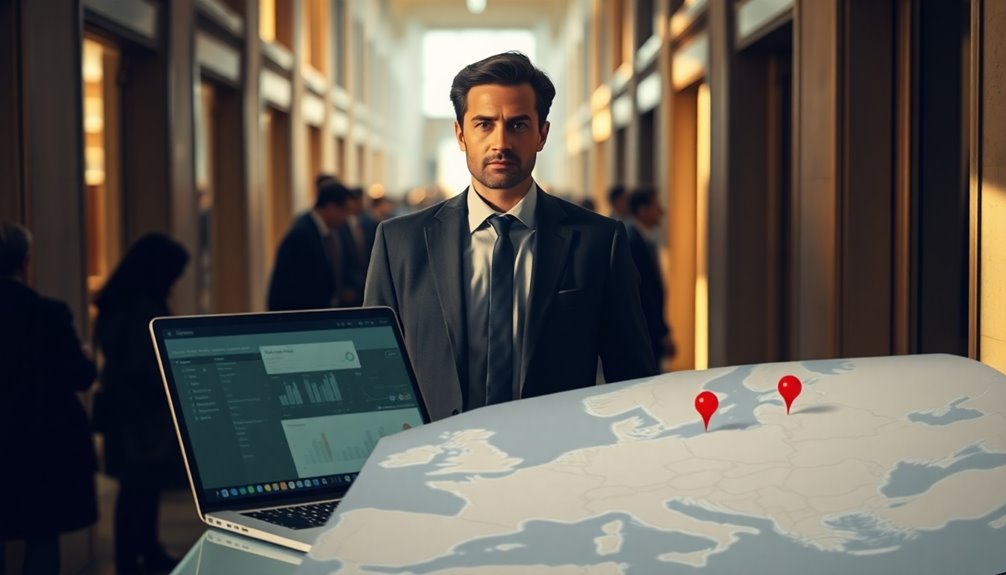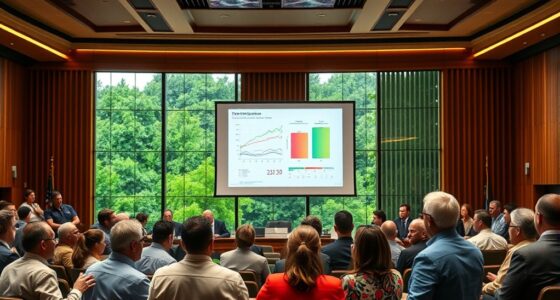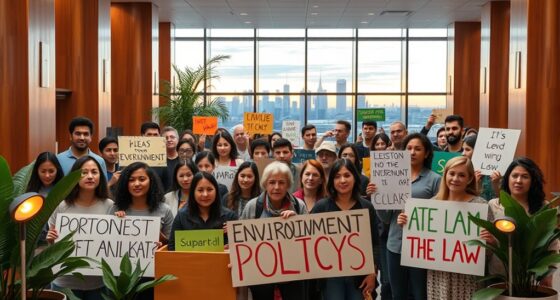As an MEP, Giuseppe Antoci's standing against organized crime from Brussels reflects his fierce commitment to safety and justice. He pushes for legislative measures, like the Antoci protocol, that combat mafia influence across Europe. Despite facing personal threats, he fights for tighter controls on EU funding and promotes collaboration between law enforcement agencies. His vision for a safer Europe includes enhanced strategies against money laundering and organized crime. You might want to explore the depths of his impactful initiatives.
Key Takeaways
- Giuseppe Antoci, an Italian MEP, focuses on combating organized crime and its European influence from his position in Brussels.
- He proposed a dedicated committee to address organized crime challenges across EU member states.
- Antoci's initiatives have led to stricter controls on EU agricultural subsidies to combat mafia-related fraud.
- He operates under police protection due to threats from mafia groups, underscoring the personal risks involved in his work.
- Antoci advocates for enhanced EU law enforcement funding and collaboration to create a comprehensive strategy against organized crime.

Giuseppe Antoci, an Italian Member of the European Parliament (MEP), is on the frontlines of the fight against organized crime, tackling the pervasive influence of mafia clans across Europe. Elected during an anti-establishment wave, you'll find Antoci relentlessly working to combat mafia activities that threaten European funding, particularly agricultural subsidies. His background in banking and as president of Nebrodi Park informs his approach, which aims to tighten controls and enhance security in vulnerable sectors. Mammography guidelines for screening can be critical in early detection of issues, paralleling the need for vigilance in the fight against organized crime.
Despite facing personal threats due to his anti-mafia efforts, Antoci remains undeterred. He recognizes that the mafia's influence stretches beyond Italy, impacting numerous European nations and creating an economic dead weight on the EU. The complexity of international organized crime complicates enforcement, making his mission even more critical. Antoci has proposed a resolution to establish a committee specifically dedicated to addressing these challenges, and he actively serves on the Committee on Civil Liberties, Justice and Home Affairs. Notably, he has already achieved significant legislative success with the passing of the "Antoci protocol(main factual point)," leading to the conviction of hundreds of mafia members.
Antoci's unwavering commitment to combatting mafia influence underscores the urgent need for a unified EU response to organized crime.
His commitment to anti-mafia initiatives has already led to stricter background checks on EU farm subsidies, shining a light on mafia-related agricultural fraud in Sicily. As president of Nebrodi Park, he successfully clamped down on mafia-controlled leases, earning accolades, including the Officer of Merit of the Italian Republic. European Commissioner Phil Hogan has even recognized his extensive work.
Given the risks he faces, Antoci operates under constant police protection, with security measures extending to his family. In the European Parliament, additional safeguards ensure his safety during meetings and public appearances. His initiatives push for expanded collaboration with Europol and Eurojust, emphasizing the need for harmonized EU rules on prisons and crime prevention.
Antoci's vision for a comprehensive EU strategy against organized crime is bold. He seeks to enhance funding for law enforcement, drive a bloc-wide crackdown on money laundering, and foster public health approaches to drug consumption. With Antoci leading the charge, there's hope for a more secure Europe.
Frequently Asked Questions
What Motivated the MEP to Focus on Organized Crime?
You're motivated to tackle organized crime due to rising public concern and electoral pressure.
The spike in gang-related violence has made safety a priority for your constituents. You recognize the economic impact of illicit activities, like the booming cocaine trade, influencing your stance.
Previous anti-crime efforts also drive you, as you aim for effective collaboration across EU member states.
How Can Citizens Support the Mep's Initiatives?
Imagine being a part of something bigger than yourself, where your actions can shape the future.
You can support MEP initiatives by attending public forums, educating yourself on their goals, and joining advocacy groups.
Stay informed through reputable news sources and use social media to raise awareness.
Reach out to your local representatives, engage in consultations, and volunteer for organizations pushing for reform.
Your involvement can make a real difference in combating organized crime.
What Specific Policies Is the MEP Advocating For?
You'll find the MEP advocating for enhanced cross-border cooperation among police forces, legislative changes like the European Arrest Warrant, and a central database for data sharing.
They're pushing for robust anti-corruption policies, judicial reforms, and better financial tracking to freeze illicit assets.
Additionally, you'll see them promoting public health strategies in drug management and harmonized prison regulations to tackle organized crime effectively across the EU.
How Does Organized Crime Impact Everyday Life in Europe?
Organized crime impacts your everyday life in Europe by undermining trust in institutions and exposing you to financial risks, like online fraud.
You might notice increased violence in your community, which can create fear and anxiety.
Additionally, the normalization of corruption affects public services and governance.
When criminal networks exploit vulnerable individuals, it creates societal disruptions that touch everyone, making it harder for you to feel safe and secure in your own environment.
What Challenges Does the MEP Face in Combating Organized Crime?
Imagine trying to catch a slippery eel with your bare hands—that's how tough it's for you as an MEP to combat organized crime.
You face challenges like diverse criminal structures that adapt quickly, making it hard to dismantle networks.
Jurisdictional issues complicate cross-border enforcement, while financial corruption undermines your efforts.
Additionally, public perception can sway support for your initiatives, requiring you to engage communities and enhance cooperation with other nations.
Conclusion
As you step away from the corridors of Brussels, imagine a modern-day knight, armed not with a sword but with legislation, bravely battling the shadows of organized crime. This MEP's quest isn't just a fight; it's a beacon of hope illuminating the dark alleys of corruption. By standing tall against these forces, you can envision a future where justice prevails, echoing the heroics of legends past, and where communities reclaim their safety and dignity.










